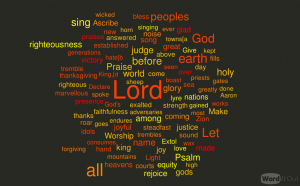If this is your first viewing, please see my Introduction before reading this.
The last four sections of the Bible in a Year blog, covering the whole of the Book of Revelation, are being uploaded together (just because I was without Internet access this week).
28 December. Revelation chapters 1-5
The book of Revelation or Apocalypse is notoriously difficult to understand, since it contains so much symbolism that people at the time of writing may have understood but which is obscure to us two thousand years later.
What is clear enough from the first three chapters is that the vision of Jesus that was given to John, was intended for the seven local church congregations listed at the start of the book. And each of them receives a particular message from Jesus, which both (in most cases) praises and (in most cases) criticises them, before offering a promise for those who stay faithful in the face of persecution. The praises, the criticisms, and the promises are specific to each place, because Jesus always knows that each person and each church community faces particular challenges and has particular strengths.
The praises, if we take them together, includes “deeds, hard work and perseverance” (2:2 and similarly in 2:19), “keeping my word and not denying my name” (3:8), and “remaining true to my name” (2:13 and similarly in 3:4). The emphasis here is on facing persecution, not necessarily by becoming martyrs (though some did) but by being true to the Christian worldview (or as we saw John calling it yesterday, “the truth”) even when to do so requires hard work and perseverance when the world is going in other directions.
The criticisms include “forsaking the love you had at first” (2:4), being “dead though appearing alive” (3:1) and “being lukewarm, neither hot nor cold” (3:16). What those have in common is lacking the outward zeal and inner joy that characterise true Christian faith. We cannot regain those by our own efforts but have to ask Jesus to send his Spirit on us again. Another criticism is claiming to be spiritually rich when one is spiritually poor (3:17); the opposite of that is holding onto faith in affliction and poverty, which makes one spiritually rich (2:9). That reminds us of the Beatitudes, where those who are poor in spirit and who suffer for the sake of Jesus are declared blessed.
The promises are expressed symbolically – “eating from the tree of life” (2:7), “not being hurt by the second death” (2:11), “hidden manna and a secret name” (2:17); “authority over the nations” (2:26); “being dressed in white” (3:5), “being a pillar in the temple of God” (3:12), and “the right to sit with Jesus on his throne” (3:21). None of these relate to our present life but all look forward to eternal life. One of the threads running through the New Testament is the idea that our rewards for living faithfully in this life will be given us in the next. The symbolism of chapters 4 and 5 is also about eternal life, in which all creatures in earth and heaven will worship God unceasingly.
Put all these together – the praises, criticisms and promises – and we have an encouragement to seek from Jesus the Spirit who gives us true love, life and warmth to strengthen us with joy in living the Christian life in the face of persecution, in order to attain eternal life which will be filled with praise and worship. It is of course impossible to really know what such existence will be like, but the Revelation reminds us to look beyond the troubles of this life and stick with Jesus along the way.

